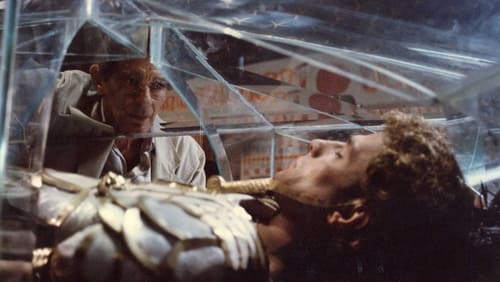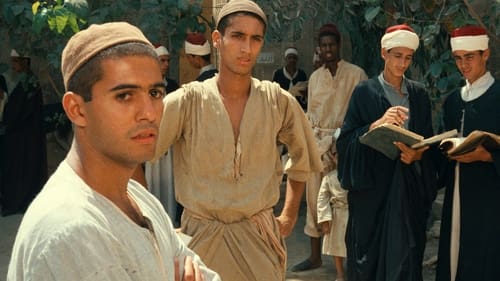
Writer
A mother and her daughter explore together the trajectory of four generations of women from their family, an Egyptian family from the Levant where life and cinema have been intimately linked and still are. A cross look between family archives where the real and the fiction and the autobiographical films of Youssef Chahine mingle. From Alexandria to Cairo, passing through Paris and Havana, an intimate and visceral narrative where mother and daughter cross space and time to trace destinies and question their emotions

Cinematography
A mother and her daughter explore together the trajectory of four generations of women from their family, an Egyptian family from the Levant where life and cinema have been intimately linked and still are. A cross look between family archives where the real and the fiction and the autobiographical films of Youssef Chahine mingle. From Alexandria to Cairo, passing through Paris and Havana, an intimate and visceral narrative where mother and daughter cross space and time to trace destinies and question their emotions

Producer
A mother and her daughter explore together the trajectory of four generations of women from their family, an Egyptian family from the Levant where life and cinema have been intimately linked and still are. A cross look between family archives where the real and the fiction and the autobiographical films of Youssef Chahine mingle. From Alexandria to Cairo, passing through Paris and Havana, an intimate and visceral narrative where mother and daughter cross space and time to trace destinies and question their emotions

Director
A mother and her daughter explore together the trajectory of four generations of women from their family, an Egyptian family from the Levant where life and cinema have been intimately linked and still are. A cross look between family archives where the real and the fiction and the autobiographical films of Youssef Chahine mingle. From Alexandria to Cairo, passing through Paris and Havana, an intimate and visceral narrative where mother and daughter cross space and time to trace destinies and question their emotions

Screenplay
Zelal is a documentary that's an invitation to delve into the world of psychiatry and "madness" in Egypt. It meets the ordinary madmen and women banished to mental institutions by Egyptian society and offers more than just a journey into their world of shadows. The hospitals end up becoming the only place patients can conceive, not because they are truly "crazy", but because they fear the outside world. The film forces viewers to put their own preconceptions and interpretations to the test, reminding us that freedom is precarious in a society that does not tolerate any differences.

Producer
Zelal is a documentary that's an invitation to delve into the world of psychiatry and "madness" in Egypt. It meets the ordinary madmen and women banished to mental institutions by Egyptian society and offers more than just a journey into their world of shadows. The hospitals end up becoming the only place patients can conceive, not because they are truly "crazy", but because they fear the outside world. The film forces viewers to put their own preconceptions and interpretations to the test, reminding us that freedom is precarious in a society that does not tolerate any differences.

Director
Zelal is a documentary that's an invitation to delve into the world of psychiatry and "madness" in Egypt. It meets the ordinary madmen and women banished to mental institutions by Egyptian society and offers more than just a journey into their world of shadows. The hospitals end up becoming the only place patients can conceive, not because they are truly "crazy", but because they fear the outside world. The film forces viewers to put their own preconceptions and interpretations to the test, reminding us that freedom is precarious in a society that does not tolerate any differences.

Producer
A documentary about the singing movement in Egypt, and on the role of the song in the social and political conflict, as it shows the lives of Umm Kulthum and Munira al-Mahdiyya and their impact on the women's liberation movement and on the field of singing in the Arab world

Producer
An enthralling look at the relationship between America and the Arab World from an Arab perspective. It tells the story of Yehia, a renowned Egyptian filmmaker whose life has been shaped by a pair of disrupted love affairs, one with an American woman named Ginger, the other with America itself.

Producer
Seekers of Oblivion explores the exciting life and adventures of Isabelle Eberhardt. Born in Geneva, Switzerland in 1877, Isabelle left Europe for North Africa at a young age. While there, she consorted with tramps, prostitutes, soldiers, murderers and thieves, at times masquerading as a man in orde.

Producer
Six strong-willed women whose adventurous streak changed the face of film industry in early twentieth century Egypt – a time when the country was, despite the liberal ripples, still steeped in conservative tradition. The film shows how these women, different as they were in class and social background, broke taboos and dismissed conventional wisdom to fulfill their overpowering passion for filmmaking. Women Who Loved Cinema takes us to the past and brings us, seamlessly, to the present day. Aziza ... Fatema ... Behidja ... Amina ... Assia … Mary... theirs is a story that will remain indelibly etched in the memory of Egyptian cinema.

Writer
Six strong-willed women whose adventurous streak changed the face of film industry in early twentieth century Egypt – a time when the country was, despite the liberal ripples, still steeped in conservative tradition. The film shows how these women, different as they were in class and social background, broke taboos and dismissed conventional wisdom to fulfill their overpowering passion for filmmaking. Women Who Loved Cinema takes us to the past and brings us, seamlessly, to the present day. Aziza ... Fatema ... Behidja ... Amina ... Assia … Mary... theirs is a story that will remain indelibly etched in the memory of Egyptian cinema.

Director
Six strong-willed women whose adventurous streak changed the face of film industry in early twentieth century Egypt – a time when the country was, despite the liberal ripples, still steeped in conservative tradition. The film shows how these women, different as they were in class and social background, broke taboos and dismissed conventional wisdom to fulfill their overpowering passion for filmmaking. Women Who Loved Cinema takes us to the past and brings us, seamlessly, to the present day. Aziza ... Fatema ... Behidja ... Amina ... Assia … Mary... theirs is a story that will remain indelibly etched in the memory of Egyptian cinema.

Producer
Set in 1987 against the backdrop of a hunger strike by the Egyptian film industry, Chahine himself steps in to play Yehia, the famed Egyptian director whose life is chronicled in "Alexandria, Why?" and "An Egyptian Story". Obsessed with Amr, the handsome actor he discovered and cast as his alter-ego in parts one and two of The Alexandria Trilogy, Yehia pressures Amr to star in various film projects that change even as Yehia's perception of the young actor begins to change. He first casts Amr as Hamlet, which the actor deems too demanding for his talents, then as the lead in a musical biopic of demigod Alexander the Great, who founded the city of Alexandria in 332 B.C.

Producer
Действие фильма развивается на фоне французской оккупации Египта (1797-1803), отображает конфликт между традиционализмом и модернизацией. Бонапарт поручает начальнику инженерного корпуса одноногому интеллектуалу Каффарелли наладить контакт с местным населением. Он знакомится с одной из египетских семей, глава который — булочник, не интересуется политикой и мечтает лишь заниматься своим делом. Старший его сын — Бакр, горячий и непреклонный примыкает к исламским фанатикам. Средний — Али философ и поэт, его увлекают технические достижения Запада, он с жаждой впитывает в себя французскую культуру. Младший Яхья — впечатлительный, легко поддается любому чужому влиянию. Каффарелли сближается с Али и Яхьей...














